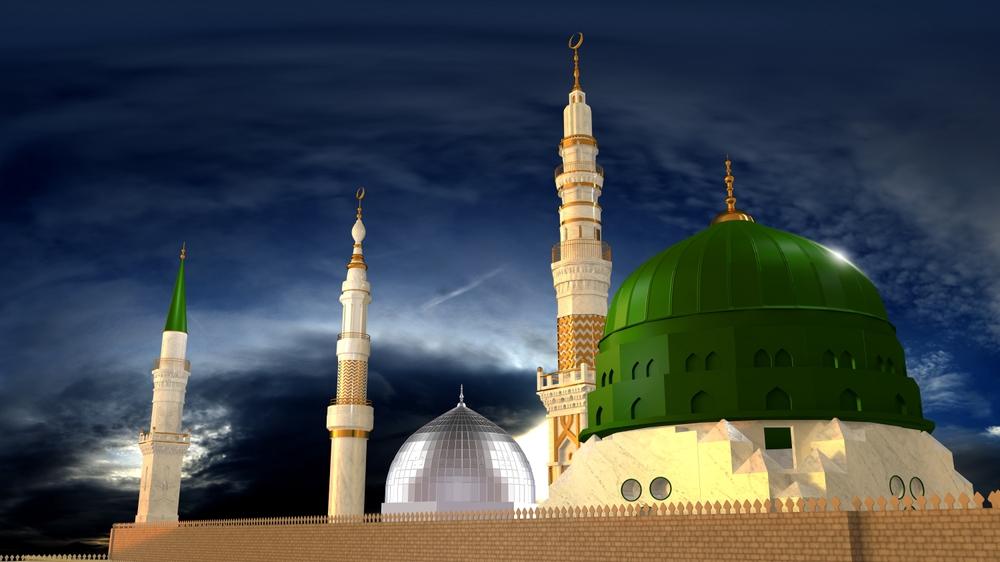
Rabi Al-Awwal is the third month in the Islamic Hijri calendar. There are many months that make up the Hijri calandar, with some being more significant than others. Rabi Al-Awwal is one of the significant months for many reasons, but it’s important to know every month of the lunar year. In order, these are Muharram, Safar, Rabi Al-Awwal, Rabi Al-Thani, Jamada Al-Awwal, Jamada Al-Thani, Rajab, Sha’ban, Ramadan, Shawwal, Dhul Qa’dah and Dhul Hijjah. Every single month in the calendar has its own historical and spiritual significance in its own right. They have shaped the Islam faith into what it is today and remind (and guide) Muslims to grow their spirituality and connect to Allah (SWT). So, let’s explore the month of Rabi Al-Awwal to gain an understanding to the common questions of “What is Rabi Al-Awwal and why is it so important to Muslims?”
The meaning of Rabi Al-Awwal holds great importance because it translates to “the first Spring” in Arabic. This means that this month for Muslims all over the world marks the beginning of Spring and has come from the arrival of the season in ancient Arabia. However, this isn’t its only meaning in Islam. The month of Rabi Al-Awwal is also a time that focuses on spiritual rebirth, reflection and joy. Muslims grow their spirituality through acts of worship and celebrate the Spring season. This is an Islamic tradition that will continue through each generation.
When it comes to what happened in Rabi Al-Awwal, it is essential to understand that there are many key events that occurred during the month. It is a sacred month because of these Islamic historic events, which shaped the religion. The most important event that happened in the month was the birth of the Prophet Muhammad (PBUH). This is a monumental event that Muslims celebrate in Rabi Al-Awwal. The celebration is known as Mawlid Al-Nabi across the world and is celebrated by both Sunni and Shi’a Muslims. However, Sunni Muslims generally celebrate on the 12th day of Rabi Al-Awwal, while Shi’a Muslims observe it on the 17th day. The Prophet (PBUH) was born in Makkah and his birth is marked to this day in the celebrations and commemorations. Many Muslims attend gatherings, give sweets and pay forward to others through acts of kindness.
Though scholars differ slightly on the exact date—some say the 12th, others the 17th—it is unanimously agreed he was born on a Monday. Several miraculous events surrounded his birth, including blessings that came to his wet nurse, Halima Sa’diyah. Her once weak donkey became strong, and her goat that produced little milk began producing abundantly, which are clear signs of divine favour.
As well as this, Rabi Al-Awwal is important because it is also the month when the Prophet (PBUH) passed away. This means that although the month is celebrated because of his birth, it is also a time of commemoration for him because of his death in the same month. The Prophet (PBUH) had been ill for several day, but his death still came as a massive shock to his companions. Umar (RA) couldn’t accept the news of the Prophet’s death at first because he was in disbelief.
The important historical events don’t stop there either, because this blessed month is also the time when the Prophet (PBUH) and Abu Bakr (RA) built the first masjid. This was built in a town called Quba, which was near Yathrib. It only took them three days to complete it and, now, it stands as a testament to the early beginnings of the Muslim community.
So, when is Rabi Al-Awwal this year? The month of Rabi Al-Awwal 2025 will begin on, or around, 28 August 2025, with it ending on, or around, 26 September 2025. These dates can vary slightly, just like with every Islamic month, because it's based on the lunar calendar. This means that the dates can change based on when the moon for the month is sighted.
The importance of Rabi Al-Awwal in Islam is immense. It is seen as a hugely significant month due to the rich history that occurred within it. The month is when the Prophet Muhammad (PBUH) was born, as well as when he died. It is also the time when the first masjid was built and the beginning of a new chapter for the early Muslim Ummah. Because of all these important events, Rabi Al-Awwal is a time of reflection for Muslims for the life of the Prophet (PBUH). This is done by studying his Seerah and trying to reflect his character and his devotion to Islam in their daily lives.
Rabi al-Awwal is a month in which deep reflection is appreciated. This means that during the honourable month, you should make time to think about the blessings you have in life. You should also reflect on the blessings that have been given to Muslims because they’re a part of the Prophet’s (PBUH) Ummah (nation). During this time, it is also a great opportunity to carry out acts of Sunnah. You can visit the sick, give to charity, help those in need, read the Qur’an and spread kindness. These acts are very highly encouraged in the Rabi Al-Awwal.
The Prophet (PBUH) said,
“When a man dies, his deeds come to an end except for three things: Sadaqah Jariyah (ceaseless charity); a knowledge which is beneficial, or a virtuous descendant who prays for him (for the deceased).” (Muslim)
And he also said,
“The believer’s shade on the Day of Resurrection will be his charity.” (Al-Tirmidhi)
You can act on these teachings by supporting the needy. Give charity and invest in your Akhira. Donate through UKIM to support global appeals in countries such as Syria, Somalia, Afghanistan, Pakistan, and many more.
Make a lasting difference- Donate now.
Copyright © 2025 UKIM All Rights Reserved.
UK Registered Charity Since 1962
Charity Registration No. 250275


